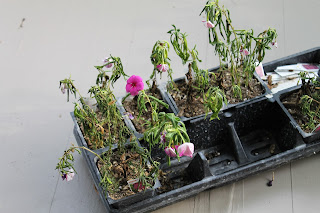After a week's vacation,
I came home to find my garden changed.
Sunflowers had burst open
tomatoes plumped up
and of course
the
weeds had a field day in my absence.
Not that my presence hinders them much,
but maybe I just noticed their usually subtle advance more since it had a week's worth of progress.
My red pepper (notably singular) is looking small but rosy and ready to pick. For those of you that purchase a plant with a bloom or,
God forbid, a fruit already forming, look to me as your example of what not to do.
The soft-hearted amongst you,
observe the fruit of my empathy. I could not pull it off when I brought it home. And this is what I have to show for my kindness: a thwarted plant. A dwarf.
You've heard it before, but maybe this will bring the message home. Plants only have as much energy as their leaves can photosynthesize.
If you bring a juvenile plant home with minimal foliage and it starts producing a fruit, that is all you will get.
One fruit. It's like a pregnant teenager...it has precariously few resources to care for itself and a baby.
Leaves are tireless little kitchens: They take their Mama's secret recipe, absorb essential amounts of sunlight, respirate oxygen and carbon dioxide, add in proprietary amounts of water and cook up some sugar.
But if their kitchen pantry only has enough ingredients in it for one small, rosy-red pepper, then that is all you will get.
More leaves equal more ingredient-laden pantries.
Get it?
Got it? Good. Even though I get it, I still made the mistake, and probably will again.
If you do too,
don't feel bad. No one will ever know as long as you don't post it online.
The house sitter kept
most of the plants alive, even though I'm sure she thought her primary objective was to keep the dog alive.
She clearly didn't think I was seriously
still trying to maintain annuals in the flat (who would?).
I came home to find them well past their permanent wilting point.
Sad face. Sad face. Sad face.
The eternal optimist/procrastinator inside me was still planning on plopping those near the birdbath
sometime before frost.
All of these changes - good and bad - were a sight for sore eyes.
Only I didn't realize they were sore.
Yesterday morning, I sat on a deck in Tennessee grieving my last moments in the Smoky Mountains. The
deep comfort of the forest, the mist hanging low, the trickles and gushes of waterfalls, I connected with it all.
My children - removed mostly from their electronics - splashed and played,
clambered up and down waterfalls, hunted for crayfish, salamanders, and the ever-illusive black bear. Given the option, I would never have left.

But the schedule and the budget demanded our return. And so with a very heavy heart, I pulled the door shut on our cabin at 8:30 yesterday morning and climbed into our Honda.
Eight hours later, I was desperate for home.
Trapped in an unholy traffic halo around Indianapolis, I dreamed of pulling into our driveway. Maybe that back-up was a bit holier than I had originally surmised. Maybe God was massaging my heart to long for home. It worked.
We pulled up and our forest-less, mist-less, waterfall-less home looked perfect. The weeds, I loved them. The slobbery dog, I loved him. The flat cornfields, I loved them.
Thankfully, these entities do not lie side-by-side with the Smokies for direct comparison. But a hypodermic shot of interstate madness was just what the Doctor ordered.
Home looked heavenly.















